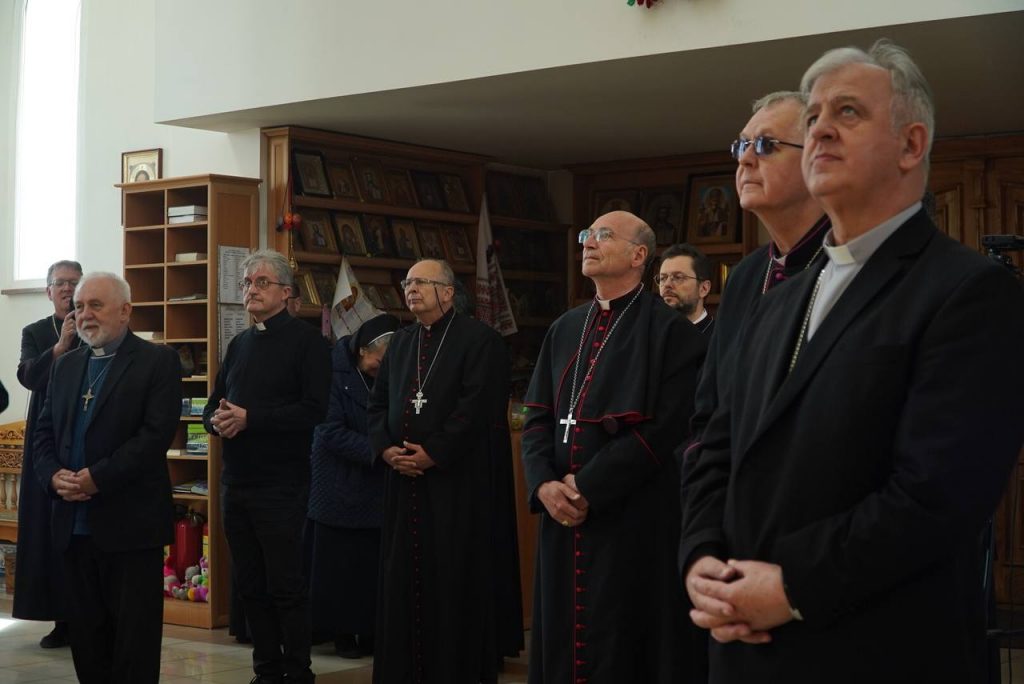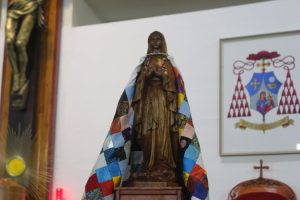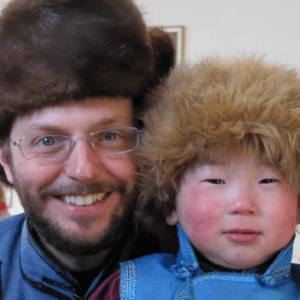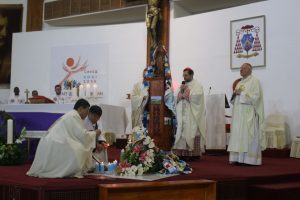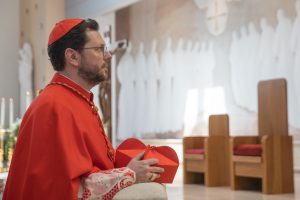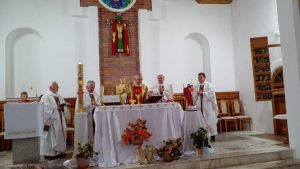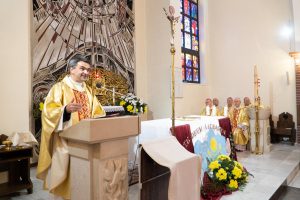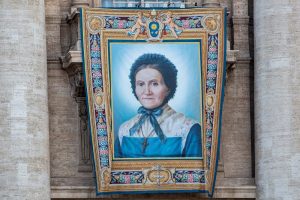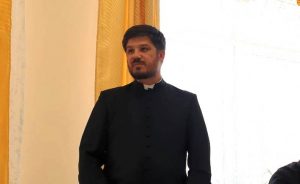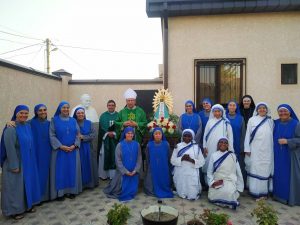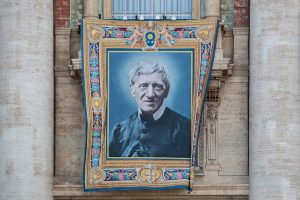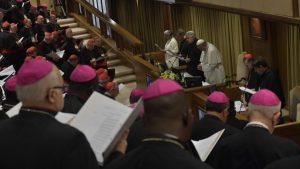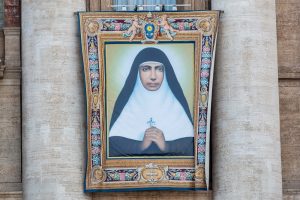On April 26, the day before the official opening of the first plenary session of the Catholic Bishops’ Conference of Central Asia, the bishops and ordinaries of Central Asia made a joint trip to Karaganda. There they visited the Higher Theological Seminary “Mary the Mother of the Church”, met with the laity in the Greek Catholic Cathedral, congratulated them on the feast of the Resurrection of Christ and shared Easter food. They then visited the Cathedral of the Blessed Virgin Mary of Fatima, where they had the opportunity to pray at the relics of Blessed Władysław Bukowiński. The day ended with the Holy Mass in the Minor Basilica of St. Joseph.
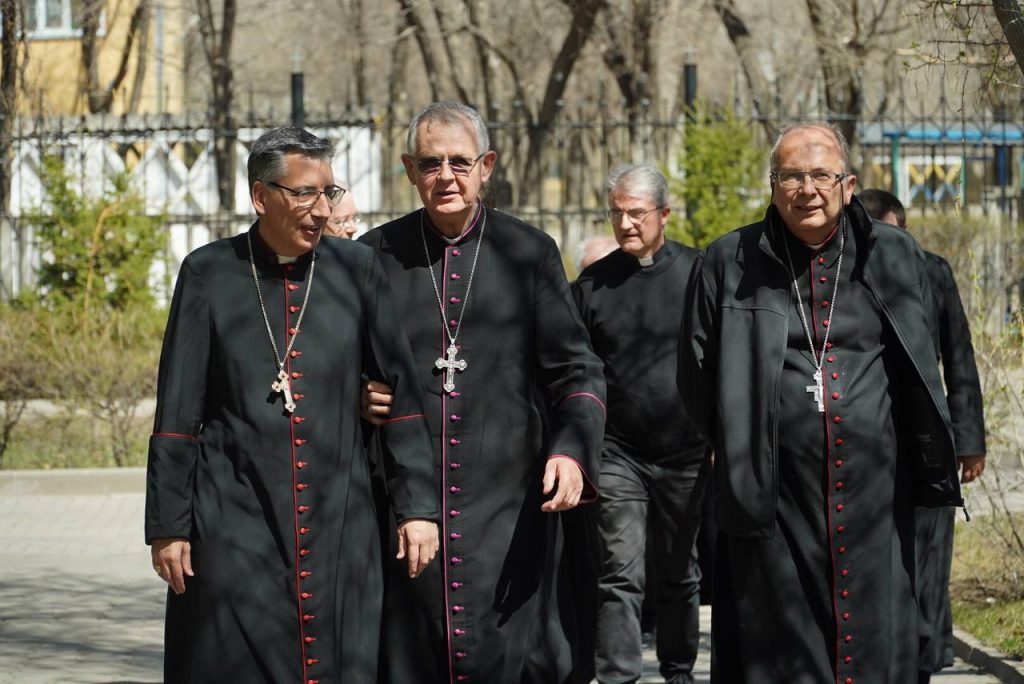
Photos of the first day of the meeting of bishops can be viewed in the album “I meeting of the Conference of Catholic Bishops of Central Asia” at the link.
Homily of Bishop Adelio Dell’Oro
Karaganda, Minor Basilica of St. Joseph, April 26, 2022 (Acts 4:32-37; Jn 3:7-15).
I am very glad and grateful to the Lord for this solemn Eucharistic service on the occasion of the first meeting of the Central Asian Episcopal Conference.
I greet the Bishop of Uzbekistan Jerzy Maculewicz, Ordinaries “missio sui iuris” in Turkmenistan, Mons. Andrzej Madej, in Tajikistan Mons. Pedro Lopez, in Kyrgyzstan Mons. Anthony Corcoran and Ordinaries of Kazakhstan, Metropolitan Mons. Tomash Peta, his assistant Mons. Athanasius Schneider, President of the Catholic Bishops’ Conference of Kazakhstan, Mons. José Luís Mumbiela Sierra, Apostolic Administrator of Atyrau, Mons. Peter Sakmara, Apostolic Administrator for Catholics of the Byzantine Rite of Kazakhstan and Central Asia, Mons. Vasyl Hovera, and, of course, Auxiliary Bishop of the Karaganda Diocese, mons. Evgeny Zinkovsky.
These Ordinaries have been joined by the Apostolic Prefect of Ulaanbaatar in Mongolia, Mons. Giorgio Marengo, Apostolic Prefect of Afghanistan Mons. Giovanni Scalese and Apostolic Prefect of Azerbaijan Mons. Vladimír Fekete.
I also greet the Apostolic Nuncio of Mongolia and South Korea, Archbishop Alfred Xuereb, and Bishop of Kielce, of Poland, Mons. Jan Piotrowski, Secretary of the Vatican Nunciature in Astana, Mons. Michele Tutalo and Mons. Piotr Pytlowany.
Today, the liturgy calls us to ask for three graces for our Christian communities: harmony, poverty, and patience.
At the center of the nightly conversation between Jesus and Nicodemus is the theme of “rebirth” in the Spirit.
The Holy Spirit gives us the courage to speak about Jesus without fear and gives us an idea of how He can transform the community: the diocesan, parish, religious and family communities.
This parish of St. Joseph in Karaganda, which was given the title of “Minor Basilica” by Pope Francis two years ago, is unique not only in Kazakhstan, but throughout the former Soviet Union, as it is one of the first officially registered parishes under the communist regime, in 1977.
When, at the beginning of March 2019, during the “ad limina” visit of the Bishops of Central Asia, we met with Pope Benedict XVI and told him about the painful but glorious history of the Catholic Church in our countries of Central Asia, where, paradoxically, thanks to the Stalinist deportations and camps, Catholics began to be present in these icy lands, he told us: “God knows how to bring good even from evil”.
“Sanguis martyrum, semen christianorum” [The blood of martyrs is the seed of new Christians], wrote Tertullian. By God’s grace and the testimony of many believers in Jesus, despite severe persecution, the city of Karaganda became the center of Catholicism during the Soviet regime.
Here were Concentration Camp “Karlag”, and those who survived from hard labor could not leave Karaganda, where, after liberation, several thousand German, Polish, Ukrainian, Lithuanian Catholics and other nationalities lived. As in the first centuries, it was the suffering and shed blood of these Catholics that multiplied the number of Christians and founded this Church.
With this arrival, taking into account the difficult Soviet reality, more than 16 vocations to the priesthood were born, including 2 bishops [Joseph Werth, bishop in Novosibirsk, and Nikolai Messmer, bishop in Kyrgyzstan and now in Heaven], more than 28 women’s vocations to consecrated life in 7 congregations and communities, most of which joined the Congregation of the Sisters Servants of Jesus in the Eucharist.
Karaganda and its environs were a place of mass migrations of people of different nationalities. In the 30s and 40s of the XX century, a large number of Germans, Poles, Ukrainians, Lithuanians, etc. moved here. They were forced to dig holes, the so-called “dugouts”, which became their first homes. Most of them, especially old people and children, died in the first winter from hunger and frost.
The founders of the parish can be considered the exiled believers, as well as priests released from the camps. The believers in Maikuduk, despite the persecution, began to gather for joint prayer, in homes and at the cemetery.
After Stalin’s death in 1953, some of the priests released from the camps began to come to Karaganda: Fr. Władysław Bukowiński, Greek Catholic Bishop Alexander Khira, Fr. Alexy Zaritsky [who was later re-arrested and tortured; he died in 1963 in Dolinka] and others.
All these priests secretly (mostly at night) served the Holy Mass, baptized and gave the Sacrament of Matrimony. People came to them from distant regions to receive the Holy Sacraments.
In addition to the priests, there were women believers. Among them was Gertrude Detzel [for whom we officially opened the beatification process on August 15 last year], and many others. All of them instructed the catechism to adults, children and adolescents, preparing them for the First Communion and other Sacraments. And they did all this under severe persecution. In their own home, Gertrude and three other women led a joint (communal) prayer life.
After the prayer houses were closed, the believers, together with Bishop Alexander Khira and priest Władysław Bukowiński (who was released from his last 3-year imprisonment in December 1961), began to intercede the Soviet authorities for the official registration of the Catholic community. Thanks to their perseverance, on January 28, 1977, the KGB from Moscow gave permission to register a religious community of the Roman Catholic faith in Karaganda. The sacrifice of the martyrs was beginning to bear fruit.
In Maikuduk, at the expense of believers, a poor house was bought, on the site of which it was planned to build a shrine. On March 19, 1977, the feast of Saint Joseph, the first Holy Mass was officially held in this “dugout”. The believers chose Saint Joseph as the patron of the parish. The first rector of the parish, Fr. Albinas Dumbliauskas [ 01/09/91] came from Lithuania.
In November 1977, with the active participation of faithful, the foundation of the future Catholic Church was laid, the foundation was consecrated by Bishop Alexander Khira. Everyone participated in the construction of the shrine, from the youngest to the olest, including the disabled and the sick.
In the spring of 1978, the construction of the walls began, and already on September 8 of the same year, the first Holy Mass was held in the newly built church of St. Joseph in Karaganda. And on June 29, 1980, Bishop Alexander Khira, solemnly consecrating the new temple, uttered unforgettable words, recalling that this foundation was literally drenched with the tears of many believers.
On July 7, 1999, this church of St. Joseph was elevated to the degree of the Cathedral of the established then Karaganda Diocese. It served such until September 9, 2012, when the new Cathedral of Our Lady of Fatima was consecrated.
At the outer walls of the church, Fr. Albinas Dumbliauskas and Fr. Alexander Staub are buried. The relics of Bishop Alexander Khira were transferred inside the church, the relics of Fr. Władysław Bukowiński were already there as well, before his beatification in 2016.
On August 7, 2021, we managed to translate the remains of the Servant of God Gertrude Detzel to this Basilica, where they now lie next to the remains of Bishop Alexander Khira, who jokingly called Gertrude “my bishop” for her zeal.
Over the past 30 years, our Catholic communities have shrunk significantly. Almost all Germans, and now many Poles, have left for their historical homeland.
The church, built in Soviet times, outwardly differed little from the surrounding houses. However, the interior finery and ornamentation surprises with its simple and surprising beauty, and even more so after the recent major interior restoration.
Today we are very happy and grateful for this gift and want to thank and pray for all the people who have made the history of this church and this parish.
But perhaps in these 30 years of freedom we have fallen asleep a little spiritually, and we need a new beginning.
The word “parish” in Greek means the presence of God “close to the house”, “παρά οικία” and therefore next to people’s lives.
And now this church is creating a living and carnal place out of us, which is called unity and merciful love, so that people living among us will recognize Jesus and get to know Him.
In an era in which globalization is leading people from all corners of the world to pursue wealth, primarily materially, we are called to a great responsibility.
The presence of the Church today will be renewed and only by the authentic testimony of us Christians today.
In this globalized world, we are called to build a living Church, and therefore, as Thomas Stearns Eliot says in poem “The Rock”:
“There is work to be done together
A Church for all
And a job for each
Every man to his work”.
There are three characteristic signs of the revival of the community from the Holy Spirit.
Harmony: “All the believers were one in heart and mind. No one claimed that any of their possessions was their own, but they shared everything they had”. Those born again from the Spirit receive the grace of unity, harmony.
There is a second sign, and it is the “common good”. We read in Scripture: “that there were no needy persons among them. For from time to time those who owned land or houses sold them, brought the proceeds from the sales to the Apostols” (Acts 4:34, NIV). This is merciful love.
The third important element given by Jesus to those who are in the midst of difficulties, and persecution, is patience, because, says Jesus, “By your patience you will save your souls” (Lk 21:19, NKJV).
In this second week of Easter, as we celebrate the Easter mysteries, let’s ask for these three graces for our communities.
Jesus tells Nicodemus that we must be born again of the Spirit: it is the Spirit that gives us a new personality, a new power, a new way of doing things.
There is a very important sign given by the Holy Spirit: “With great power the apostles continued to testify to the resurrection of the Lord Jesus. And God’s grace was so powerfully at work in them all” (Acts 4,33, NIV).
The sign of true rebirth is the courage to bear witness to the resurrected Lord to all people.
“The promise is for you and your children and for all who are far off—for all whom the Lord our God will call” (Acts 2:39, NIV), that is, salvation is for everyone.
We can be reborn from what little we are, from our sinful existence, only with the help of the same power that resurrected the Lord: the power of God, and for this the Lord sent the Holy Spirit to us.
Official opening of the First plenary meeting of the CBCCA>>
Review of the first meeting of CBCCA and Dedication of the Central Asia to the Holy Mother of God >>
